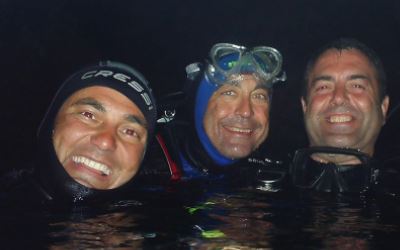Although dive lights are largely used for cave diving and night scuba diving, some designs are specifically meant for daytime diving. Seasoned divers know that everything begins to look dull at 20 to 30 feet underwater during the day. If the sunlight is not sufficient to illuminate the colors of sea creatures and plants, using the right artificial scuba dive lights can help make your exploration more spectacular. Moreover, a light can come in handy for peeking into cracks and crevices.
What kind of dive light do you need for daytime dives? As a rule, divers typically carry two kinds of light sources: a wide-beamed primary dive light to illuminate a large area and overcome complete darkness, and a smaller, brighter secondary light to focus on the details. For daytime diving, you don’t have to overcome complete darkness – even on cloudy days. So you only need a light to help you peer in holes, under ledges, and scrutinize details. Choose a light with a narrow beam angle but with limited candlepower, such as a basic LED light with a 45-minute incandescent bulb.
Other considerations for choosing a dive light for daytime diving include:
• Small and compact: You don’t need the candlepower to illuminate the evening reef. So, choose a small light that fits comfortably in your hand. The on/off switch should be positioned in a convenient position. Since you won’t be using it throughout your dive, ensure that it fits in your BC pocket so you can use your hands freely.
• Low cost: There are many models of dive lights today. To narrow down your options, one of the first things you should consider is how you intend to use the light. For daytime dives, you only need a light to read unlit gauges, inspect marine life and plants closely, and perhaps signal your dive buddy. An inexpensive LED dive light should be sufficient.
• Depth rating: Make sure that you choose a dive light that is rated for the depth you intend to dive at. Exceeding the recommended depth rating can subject the torch to stress, causing it to deform and malfunction. And for your own safety, you should always turn back when one of your torches gets damaged.
Final Tip: Get the Necessary Extras Even when using a cheap, basic dive light for daytime diving, it can still be very inconvenient if you have to turn back because you lost your light. If it doesn’t come with a lanyard, make sure to buy one. Attaching your light to your wrist is good insurance against losing it. Carry an extra lanyard if possible, as well as an extra bulb and batteries for your peace of mind.



